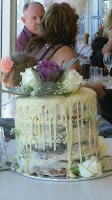An Australian custom that I did not appreciate on my first visit in 2008 I have come to appreciate in 2018. It only took me five trans-Pacific trips and countless experiences among these delightful people to see their point when, at every public meeting or ceremony, they honor the first Aboriginal people of this land. Usually it is a simple welcome to country in the name of the clan or (in the American parlance, "tribe") who had made this particular locality their home for 50,000 years. I say it took me this long to appreciate the custom because it is so different from our own country, where the original inhabitants were displaced and forgotten, except for those crowded into reservations which we also find so easy to ignore. Here, these native peoples may have, for the most part, vanished as a recognizable subgroup in may cities and communities, but they are not forgotten. Their place names are used, and their original occupancy acknowledged at every public gathering. If I had any criticism of this custom at all it is only to the variation I have occasionally heard. Sometimes when a speaker begins the tradition he or she will refer to a particular group as the original "owners" of the land. In my opinion, there is no need to saddle this ancient culture with such an alien concept as land "ownership" to appreciate the fact they were here first. It is more appropriate to refer to them as the traditional "custodians" of the land, for that more precisely describes their role and reinforces the concept that THEY GOT HERE FIRST!
I thought of this introductory custom while thinking about the author's reading we attended on Friday night. It was delightful, and aside from Thomas Keneally we heard from Brigid Delaney,
Kon Karapanagiotidis, and Sarah Krasnostein. Delaney was particularly enjoyable and her talk had us laughing loudly. Her book is a sort of modern take on the "Road to Wellness," and she described her experiences while she endured a fifteen day fasting clense in hilarious detail.But you are wondering about the title of this entry, and I will explain. Yesterday we boarded the Nimbin "Grasshopper" tour bus that journeys to the little interior countercultural town famous for its annual "Mardi Grass" festival. Nimbin used to be a lot more freewheeling and lively, but increased police activity and the burning of their beloved museum a few years back has reduced the place to a shadow of its former glory. No matter. We were simply along for the ride, and our driver was none other than Ivan, the same chap who took me to Nimbin in 2012. (He explained he never really wanted a "real" job.) We journeyed down delightful twisting country roads, stopped for
a great little sausage sizzle a the lake, and then made one more stop at Minyon Falls before returning home. Minyon Falls is a magnificent drop down a rocky escarpment, but has been reduced to a trickle due to the drought. While staring down into the deep forest below, I could not help to think of the original custodians of this land, and feel grateful that we are welcomed here after we have honored them.












